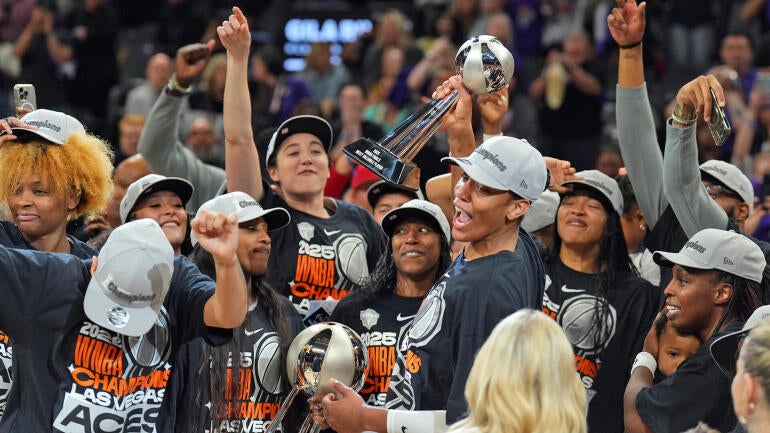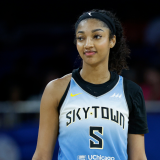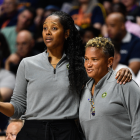Where do Aces rank among WNBA's all-time teams? A definitive history and ranking of the league's dynasties
The Aces joined the Houston Comets as the only teams to win three titles in a four-year span

On July 25, the Las Vegas Aces were below .500 and clinging to a playoff spot. On Friday, they defeated the Phoenix Mercury, 89-78, in Game 4 of the 2025 WNBA Finals to win their third title in four years, capping the most remarkable late-season turnaround in league history.
The Aces won 16 consecutive games to close the regular season, finished with a 30-14 record and earned the No. 2 seed in the playoffs. They were unable to carry that momentum into the early rounds of the playoffs, however.

In the first round against the Seattle Storm, they needed a go-ahead putback from Jackie Young with 12 seconds left in the winner-take-all Game 3 to advance. Then, in the semifinals, they lost Game 1 to the shorthanded Indiana Fever, and were taken to overtime in the deciding Game 5 before escaping.
While they ended up sweeping the Mercury in the Finals, even that was not without some frightening moments. They had to complete a fourth-quarter comeback in Game 1, needed a last-second game-winner from A'ja Wilson in Game 3 and had to hold off a comeback attempt in Game 4.
This was not the Aces' best team, nor was it their most impressive playoff run, but at every turn, they came up with big moments when they needed them. In the process, the Aces established themselves as one of the league's few true dynasties.
Now that they have three titles to their name, where does this Aces group rank among the league's all-time teams? Let's take a look back through the archives for a definitive history and ranking of the WNBA's dynasties as it approaches a landmark 30th season in 2026.
Honorable mentions
Los Angeles Sparks (1999-2003)
The Sparks had the misfortune of being a great team at the same time as an all-time team, losing to the Houston Comets in the Western Conference finals in 1999 and 2000. They finally got past the Comets in 2001 en route to their first title, then went back-to-back in 2002. In 2003, their three-peat attempt came to an end in the Finals with a loss to the Detroit Shock.
While Lisa Leslie and company were awesome during this era, two titles are not enough for a dynasty.
Phoenix Mercury (2007-14)
The Mercury are one of three teams tied for the second-most titles with three, and are also tied for the second-most Finals appearances with six. Their run from 2007-14 was the most successful in franchise history, but their three titles during that extended era came in 2007, 2009 and 2014, and the five-year gap between the second and third trophy is too big to consider them a true dynasty -- especially when they didn't make another Finals appearance during that time.
Seattle Storm (2004-20)
The Storm are tied for the most titles ever with four, but their trophies are way too spread out to consider them a dynasty. They won it all in 2004 and 2010, then again in 2018 and 2020. The second run with Breanna Stewart, Jewell Loyd and Sue Bird was the closest they came to an actual dynasty, but again, two titles in short succession is not enough -- especially with no other Finals appearances to their name.
4. Detroit Shock (2003-08)
- Titles: 3
- Finals appearances: 4
- Playoff record: 27-16
- Sweeps: 3
- Back-to-back? No
The Shock are often forgotten when discussing the league's dynasties and best teams because of the era they played in and their eventual relocation to Tulsa, and now Dallas.
After entering the WNBA in 1998 as part of the league's first expansion push, the Shock took a while to get going. They often languished at the bottom of the standings and didn't win a playoff game in their first five years of existence. Late in the 2002 season, however, they hired former Detroit Pistons Bad Boy Bill Laimbeer as their new coach, and in 2003 they drafted Cheryl Ford to form a Big Three alongside previous draftees Deanna Nolan and Swin Cash.
Everything clicked into place in 2003, when the Shock went 25-9 -- which remains a franchise record for wins in a season -- and earned the top overall seed in the playoffs. They defeated the Cleveland Rockets in the first round to win their first-ever playoff series, then swept the Connecticut Sun in the Eastern Conference finals to set up a matchup with the Sparks in the Finals. The Sparks were looking for a three-peat and won Game 1, but the Shock bounced back to take Games 2 and 3 in dramatic fashion to capture their first championship.
The 2004 Shock could not find the same magic. They struggled through the regular season and finished 17-17. In the playoffs, they were eliminated in the first round by the New York Liberty after blowing a 15-point lead in the winner-take-all Game 3. Bethany Donaphin -- now the WNBA's head of operations -- hit a last-second jumper to end the Shock's season.
The 2005 Shock were even worse despite the mid-season arrival of Katie Smith. They finished below .500 at 16-18, and were lucky to sneak into the playoffs via a tiebreaker. In the first round, they were overmatched against a great Sun team and were swept in two games.
The 2006 Shock finally got back on track, thanks in large part to a full season of Smith, and went 23-11. In the first round of the playoffs, they swept the Indiana Fever with relative ease, which set up a rematch against the Sun in the Eastern Conference finals. This time, the Shock were ready and won in three games after a dominant victory in the winner-take-all Game 3. In the Finals, they faced the Sacramento Monarchs and the teams traded blowout wins in the first four games. That set up a deciding Game 5, which the Shock held on to win for their second title in four years.
The 2007 Shock went 24-10 despite an injury to Ford, and earned the top seed in the playoffs. However, they were nowhere near as dominant in the playoffs. They barely escaped the first round after an overtime victory in the deciding Game 3 against the Liberty, then went the distance against the Fever in the Eastern Conference finals as well. In the Finals, they were up against the Mercury and jumped out to a 2-1 lead, but lost a heartbreaker in Game 4 and then were stunned by 16 at home in a winner-take-all Game 5. Alas, there would be no repeat.
The 2008 Shock were out for revenge and went 22-12 to earn the top seed in the Eastern Conference. Once again, they needed to go the distance in both the first round and Eastern Conference finals, but they got the job done against the Fever and Liberty, respectively. That set up a Finals matchup with the San Antonio Silver Stars, who were led by current Aces coach Becky Hammon. The Shock made easy work of the Silver Stars and swept them in three games to claim their third title in six years, which at that time was second only to the Comets for the most trophies.
Early in the 2009 season, Laimbeer resigned and was replaced by his old Pistons teammate, Rick Mahorn. The aging Shock never got on track, finished 18-16, and were bounced in the Eastern Conference finals by the Fever. A few weeks after their season-ending defeat, they were relocated to Tulsa, and in nearly two decades since then have only won one playoff series.
The Shock's consecutive first-round exits after their first title are a mark against them, and they would also likely be remembered in a better light if they had completed a repeat at any point. Even so, three titles and four Finals appearances in six seasons were an incredible run that few franchises have ever matched.
3. Las Vegas Aces (2020-2025)
- Titles: 3
- Finals appearances: 4
- Playoff record: 35-15
- Sweeps: 5
- Back-to-back? Yes
There are a few different possible starting points for this Aces dynasty. You could trace it back to 2019, when they made the semifinals, or as late as 2022, when they won their first title. However, their first Finals appearance in 2020 feels like the sweet spot.
The 2020 Aces went 18-4 in the COVID-shortened bubble season, tying for the best record in the league with the Storm. Of course, there was no homecourt advantage that season, so seeding didn't matter all that much. The Aces battled past the Connecticut Sun in five games in the semifinals, but were overmatched against a great Storm team in the Finals and got swept. It was clear, though, that with A'ja Wilson, Jackie Young and Kelsey Plum leading the way, they were on the rise.
The 2021 Aces proved as much by going 24-8 thanks to Liz Cambage's return -- she sat out of the bubble -- and Chelsea Gray's arrival in free agency. They were unable to carry their regular-season dominance into the playoffs, however, and were stunned in the semifinals by the Mercury, who battled back from a double-digit deficit in the winner-take-all Game 5 and won thanks to a pair of last-second free throws by Shey Peddy.
The 2022 Aces were on a mission to right their playoff wrongs. They hired Becky Hammon as their new coach, finished in first place at 26-10, won the Commissioner's Cup and earned the No. 1 seed. In the playoffs, they got revenge on the Mercury with a first-round sweep, cruised past the Storm in the semifinals, 3-1, then defeated the Sun by the same margin in the Finals to win the first title in franchise history.
The 2023 Aces were an all-time team. They added Candace Parker in free agency and went 34-6 in the regular season to set the single-season wins record and register the fifth-best winning percentage (.850) ever. In the playoffs, they swept the Chicago Sky in the first round and the Dallas Wings in the semifinals. In the Finals, they faced the New York Liberty in a matchup of superteams and won in four games. They lost only seven games all year, combining the regular season and playoffs, and became the third team ever to win back-to-back titles.
The 2024 Aces ran out of gas. Parker retired, Gray wasn't the same after breaking her foot in the 2023 Finals and though Wilson's individual greatness carried them to a 27-13 record, they were not a real threat come playoff time. After gutting out a first-round sweep of the Storm, they were bounced in the semifinals by the Liberty, who were out for revenge and largely dominated the series.
Ahead of the 2025 season, the Aces swapped Plum for Jewell Loyd and looked even worse than they did in 2024. It seemed their run was truly over when they were still under .500 in late July, were under .500 in late July, and that was before they lost by 53 to the Lynx in the second-largest defeat in league history. Then, suddenly, they flipped a switch. They closed the regular season on a 16-game winning streak to earn the No. 2 seed and battled their way through the playoffs. While they were nowhere near as dominant as they were in 2022 and 2023, they came through in every big moment.
The Aces officially became a dynasty with their third title in the span of four years (or six years if you extend back to their first Finals appearance). The 2023 team is one of the best we've ever seen, but on the flip side, the 2025 team is one of the weaker champions in recent memory.
In any case, the Aces come in third here. They won their titles in a shorter span and against better competition than the Shock, but don't have as many championships as the two teams above on the list. Of course, they're also still active and can add to their ring count.
2. Houston Comets (1997-2000)
- Titles: 4
- Finals appearances: 4
- Playoff record: 16-3
- Sweeps: 4 (also won two single-elimination games)
- Back-to-back? Yes
The now-defunct Houston Comets were one of the league's original teams and its original dynasty.
In January of 1997, prior to the WNBA's inaugural season, the Comets hit the jackpot when they were assigned Sheryl Swoopes and Cynthia Cooper during the initial player allocation process. A few months later, their good luck continued when they won the 1997 Draft Lottery. With the No. 1 overall pick of the 1997 WNBA Draft, they selected Tina Thompson.
Swoopes, Cooper and Thompson were an unfair trio, particularly in the league's early days, when there were only eight teams to start, followed by rapid expansion. Cooper won the first two MVP awards and Swoopes won in 2000 (she later added two more, along with three Defensive Player of the Year awards).
The 1997 Comets went 18-10 to earn the top seed in the four-team playoffs, which were contested in a single-elimination bracket. They took care of the Charlotte Sting in the first round, then beat the Liberty in the championship game. Neither contest was close, and the Comets easily won the first title in league history.
The 1998 Comets were even better. They went a remarkable 27-3 to earn the top overall seed in the playoffs, and their .900 winning percentage remains the best in league history. The league slightly expanded the playoffs in its second season. While there were still only four teams involved, they played best-of-three series instead of single-elimination games. The Comets swept the Sting in the semifinals, but were stunned in Game 1 of the Finals by the Mercury. In Game 2, the Mercury were up by double digits in the fourth quarter, but the Comets stormed back to win in overtime, before taking Game 3 in less dramatic circumstances to become the first team to repeat as champions.
The 1999 Comets "only" went 26-6, but that was still good enough for the top seed in the playoffs. Come playoff time, they once again faced a bit of trouble after losing Game 1 of the first round to the Los Angeles Sparks, but bounced back to take that series in three games. They were then on the verge of sweeping the Liberty in the Finals until Teresa Weatherspoon hit "The Shot" from halfcourt at the buzzer of Game 2 to force another winner-take-all Game 3. The Comets won that contest handily to become the first -- and still only -- team to three-peat.
The 2000 Comets were arguably the best team of the bunch. They went 27-5 in the regular season, boasted a plus-18.4 net rating and didn't lose a single game in the playoffs. By this time, the playoffs had expanded to three rounds. They swept the Sacramento Monarchs in the first round, Lisa Leslie and the top-seeded Los Angeles Sparks in the Western Conference finals -- by far the most impressive playoff result of their entire run -- and the Liberty in the Finals. Since the league introduced playoff series in 1998, the 2000 Comets remain one of four teams to have a perfect postseason run, along with the 2010 Storm, 2013 Lynx and 2020 Storm.
The 37-year-old Cooper retired for the first time after the 2000 title and Swoopes missed the 2021 season after tearing her ACL, and with that, the Comets' dynasty came to an abrupt end. They remained competitive for a few years, but only won one more playoff series before the franchise folded in 2008.
The Comets are the only team to win four titles in a row -- no one else has even three-peated -- and anyone who wants to say that they're the best dynasty based on that fact alone has a valid argument. However, if we're only going to look at which team has won the most titles in a row to determine these rankings, there's not much point in going through the exercise.
We have to acknowledge that the Comets were handed a major talent advantage in one of the league's weakest eras -- go look at the box score for Game 3 of the 1999 Finals, for example -- and never had to play in a playoff series longer than three games. For the sake of comparison, the 2025 Aces won nearly as many playoff games en route to their title (nine) as the Comets did in their first three playoff runs combined (10).
In particular, it's difficult to regard the Comets' 1997 championship as equal to other titles when the "Finals" were only one game. Winning a single contest against an overmatched Liberty team to claim the trophy is not as impressive as what teams later in the league's history had to accomplish to earn their rings.
None of that is the Comets' fault, but the margins are fine when you're debating dynasties. Of this elite group of teams, the Comets also had the shortest run, which stopped abruptly after four years. There is no doubting the Comets' greatness, but they weren't the greatest.
1. Minnesota Lynx (2011-17)
- Titles: 4
- Finals appearances: 6
- Playoff record: 40-15
- Sweeps: 10
- Back-to-back? No
The Lynx entered the league as an expansion franchise in 1999, during the middle of the Comets' run, and were something of an afterthought for their first decade-plus of existence. They only made the playoffs twice from 1999-2010, and were eliminated in the first round both times.
Everything changed in 2011, when they won the Draft Lottery and selected Maya Moore with the No. 1 overall pick. Seimone Augustus, Lindsay Whalen, Rebekkah Brunson and coach Cheryl Reeve were already in town, and once Moore arrived the team instantly transformed into a contender.
In 2011, the Lynx went 27-7 -- prior to that season, they had never won more than 18 games -- to earn the top seed in the postseason. They ran into a bit of trouble in the first round against the Silver Stars, but dominated the winner-take-all Game 3 and never looked back. They swept the Mercury in the Western Conference finals and the Atlanta Dream in the Finals to win the first title in franchise history. Of their six consecutive wins to close the playoffs, four of them came by at least 14 points.
The 2012 Lynx also went 27-7 in the regular season to earn the top seed in the playoffs. They had to survive a very tough test in the first round, but outlasted the Seattle Storm in three games before sweeping the Los Angeles Sparks in the Western Conference finals. In the Finals, Tamika Catchings and the Indiana Fever proved too tough, and the Lynx fell in four games in what would be the first of many failed repeat quests.
The Lynx were out for revenge in 2013, and once again cruised through the regular season with a 26-8 record. This time around, there was no match for them in the playoffs. In the best postseason run in league history, the Lynx swept the Storm, Mercury and Dream consecutively to win their second title in three seasons. They were a perfect 7-0 in the playoffs with a plus-20.2 net rating, which remains the highest in postseason history. Of the four teams with a perfect playoff run since the league introduced series, the 2010 Storm are the only other team to go 7-0. (The 2000 Comets and 2020 Storm went 6-0).
A few injury problems cropped up in 2014, and the Lynx "only" went 25-9, which meant they had to settle for the No. 2 seed behind a juggernaut Mercury team (29-5). After sweeping the Stars in the first round, the Lynx squared off with the Mercury for another of their epic playoff battles throughout this era. In what was essentially the Finals, the teams split the first two games of the Western Conference finals, before the Mercury dominated the winner-take-all Game 3. This was the only time during the Lynx's dynasty that the Mercury defeated them in the playoffs, and the loss once again ended a repeat attempt.
The 2015 Lynx took another slight step back in the regular season and finished with a 22-12 record. However, their mid-season trade for Sylvia Fowles gave them a true center to battle with Brittney Griner and ensured their dynasty would continue. They beat the Sparks in three games in the first round of the playoffs, then swept the Mercury in a Western Conference finals rematch, before getting another shot at the Fever in the Finals. Again, the Lynx earned their revenge in a thrilling five-game series that featured Moore's iconic Game 3 buzzer beater. They cruised in Game 5 to claim their third title in five years.
Thanks in large part to a full season of Fowles, the Lynx went 28-6 in 2016 and earned the top seed in the revamped playoff format, which offered byes to the semifinals for the top-two seeds and made conference affiliation irrelevant. After once again sweeping the Mercury in the semifinals, the Lynx faced the Sparks in the Finals. Previously, that would not have been possible, but the league made a prescient decision because the Sparks had built a superteam of their own to combat the Lynx. In arguably the best Finals ever, the Sparks won a dramatic winner-take-all Game 5 on a last-second basket by Nneka Ogwumike. For the third time, the Lynx fell short of a repeat.
By 2017, most of the Lynx's core was in their mid-30s, but they still had enough juice for one more run. Fueled by their devastating defeat to the Sparks in 2016, they went 27-7 to earn the top seed in the playoffs. After sweeping the Washington Mystics in the semifinals, the Lynx got their rematch with the Sparks. And though they fell down 2-1 in the series, the Lynx bounced back to win Games 4 and 5 in convincing fashion to capture their fourth championship in seven years.
While everyone returned in 2018, the core was just too old. They went 18-16 and were stuck with the No. 7 seed in the playoffs, which forced them into a single-elimination first-round game -- ironically against the Sparks. Brunson was injured and unavailable, Augustus and Whalen were on their last legs and they lost by seven in a hard-fought contest. Moore stunned the basketball world by retiring after that season, while Whalen and Brunson also called it a career. And with that, the Lynx's dynasty was over.
The Lynx never went back-to-back, which is a real strike against them in the debate about the best dynasty ever. However, on multiple different occasions, they narrowly missed out -- by a few seconds in 2016 -- on rings that would have given them a three-peat.
In any case, dynasties are not defined by repeats, but by sustained greatness, and no team in WNBA history has done that better than the Lynx. Over a seven-year period, they went 182-56 in the regular season and 40-15 in the playoffs, were never eliminated before the semifinals, completed 10 sweeps, had the single most dominant postseason run ever in 2013, made six Finals appearances and won four titles.
Their six Finals appearances in that run alone would be tied for the most in WNBA history (in 2024, they made their seventh Finals trip, which is a record), and their four titles are tied with the Comets and Storm for the most ever.
It's also crucial to consider the circumstances in which the Lynx competed. With respect to the Comets, they were not running through the playoff gauntlet that the Lynx faced year after year, which required more games and series, played at a faster pace against significantly better competition.
There are many who will consider the Comets' four-peat a trump card. But the Lynx have four titles of their own and sustained their success over a longer period in a more competitive era, which makes them the WNBA's greatest dynasty.


















